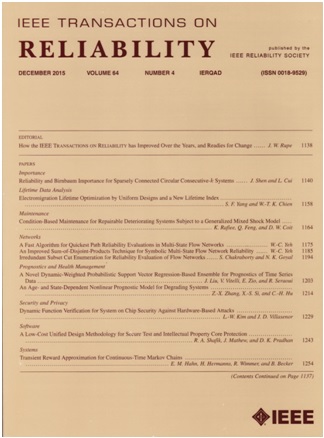An Extended Gamma Process for Accelerated Destructive Degradation Test: Modeling and Optimal Design
IF 5.7
2区 计算机科学
Q1 COMPUTER SCIENCE, HARDWARE & ARCHITECTURE
引用次数: 0
Abstract
Accelerated destructive degradation testing (ADDT) has become an invaluable method in reliability analysis, especially for highly reliable products. A common characteristic in many degradation studies is the presence of randomness in the initial degradation levels of testing units. Products with poor initial degradation levels tend to fail earlier. This study proposes an extended gamma process model that accommodates the random initial degradation value to accurately describe the degradation process over time. Under this modeling approach, we propose approximation methods for the conditional mean-time-to-failure (MTTF) and conditional variance of failure times to evaluate the impacts of initial degradation levels on product quality and reliability. We adopt a maximum likelihood approach to estimate the model parameters and MTTF under normal use conditions. In addition, we determine the optimal initial degradation threshold for removing poor-quality products and the proportion of products below this threshold. Based on the proposed model, the optimal ADDT plan is derived by minimizing the asymptotic variance of estimated MTTF under normal use conditions. A Monte Carlo simulation is conducted to assess the performance of the proposed inferential methods. Finally, a real-world ADDT dataset is analyzed to illustrate the proposed model and methodologies for making informed decisions on quality and reliability management.加速破坏性退化试验的扩展伽玛过程:建模和优化设计
加速破坏性退化试验(ADDT)已成为可靠性分析的一种宝贵方法,特别是对于高可靠性产品。在许多退化研究中的一个共同特征是测试单元的初始退化水平存在随机性。初始降解水平差的产品往往会更早失效。本研究提出了一个扩展的伽马过程模型,该模型可以适应随机初始退化值,以准确描述随时间的退化过程。在此建模方法下,我们提出了条件平均失效时间(MTTF)和失效时间条件方差的近似方法,以评估初始退化水平对产品质量和可靠性的影响。我们采用极大似然方法来估计模型参数和正常使用条件下的MTTF。此外,我们确定了去除不良产品的最佳初始降解阈值和低于该阈值的产品比例。基于该模型,通过最小化正常使用条件下估计的MTTF的渐近方差,推导出最优的ADDT方案。通过蒙特卡罗仿真来评估所提出的推理方法的性能。最后,分析了一个真实的ADDT数据集,以说明所提出的模型和方法,以便在质量和可靠性管理方面做出明智的决策。
本文章由计算机程序翻译,如有差异,请以英文原文为准。
求助全文
约1分钟内获得全文
求助全文
来源期刊

IEEE Transactions on Reliability
工程技术-工程:电子与电气
CiteScore
12.20
自引率
8.50%
发文量
153
审稿时长
7.5 months
期刊介绍:
IEEE Transactions on Reliability is a refereed journal for the reliability and allied disciplines including, but not limited to, maintainability, physics of failure, life testing, prognostics, design and manufacture for reliability, reliability for systems of systems, network availability, mission success, warranty, safety, and various measures of effectiveness. Topics eligible for publication range from hardware to software, from materials to systems, from consumer and industrial devices to manufacturing plants, from individual items to networks, from techniques for making things better to ways of predicting and measuring behavior in the field. As an engineering subject that supports new and existing technologies, we constantly expand into new areas of the assurance sciences.
 求助内容:
求助内容: 应助结果提醒方式:
应助结果提醒方式:


